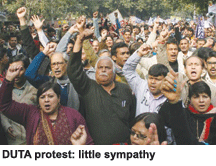A legal battle is being fought between the 9,000-strong teachers’ community and manage-ment of Delhi University (DU) in the high court. At issue is the management’s proposal to introduce the semester system for undergraduate study from the start of the new academic year beginning July. Confronted with faculty obduracy on this issue, on May 6, DU’s registrar filed an application in the Delhi high court for an order directing DUTA (Delhi University Teachers’ Association) to stop its campus protests and cooperate with the management to implement the semester system. However on May 21 when the application was heard, the court asked the university authorities not to implement the new system in a hurry, and hold discussions with faculty representatives and academic council members, and report back on August 28.
 The controversy has its genesis in the Eleventh Plan document which recommends a credit-based system in the interests of “curricular flexibility and students’ mobility”. This recommendation was endorsed by the University Grants Commission which through a directive dated March 30, 2009, asked universities to switch to the semester system by 2012. “The semester system goes far beyond being a ‘time-format’. It enlarges curricular space, and encourages and supports accelerated learning opportunities for all concerned. Further, it has the ability to accommodate diverse choices that dynamic and motivated students may like to have,” said UGC chairman Dr. Sukhdeo Thorat in the directive letter. However, the great majority of DU faculty members and affiliated colleges have been resisting the semester system proposal on the ground that the varsity has been following the annual examination system since 1922.
The controversy has its genesis in the Eleventh Plan document which recommends a credit-based system in the interests of “curricular flexibility and students’ mobility”. This recommendation was endorsed by the University Grants Commission which through a directive dated March 30, 2009, asked universities to switch to the semester system by 2012. “The semester system goes far beyond being a ‘time-format’. It enlarges curricular space, and encourages and supports accelerated learning opportunities for all concerned. Further, it has the ability to accommodate diverse choices that dynamic and motivated students may like to have,” said UGC chairman Dr. Sukhdeo Thorat in the directive letter. However, the great majority of DU faculty members and affiliated colleges have been resisting the semester system proposal on the ground that the varsity has been following the annual examination system since 1922.
Quite obviously the faculty and DUTA are opposed to the semester system because it increases their workload. Under this system they will have to conduct two exams and grade answer papers twice per year, against once currently. While DUTA is obfuscating this issue, with his sharp legal mind Union HRD minister, Kapil Sibal was quick to discern the reluctance of the teachers’ community to rise to the occasion. “It requires hard work and integrity on the part of teachers which is missing because they will have to work hard,” he remarked while endorsing the semester system on December 18 last year.
Independent monitors of India’s crumbling higher education institutions have little sympathy for DUTA’s opposition to the semester system. “In recent years the pay and perks of Delhi University teachers have improved considerably, particularly after the Sixth Pay Commission award. Currently, the gross monthly remuneration of a DU assistant professor is around Rs.40,000 and a professor Rs.75,000. In addition DU faculty enjoy long summer and winter holidays. Yet while they are always agitating for higher pay, they are most reluctant to improve productivity,” says a dissident DUTA member speaking on condition of anonymity.
Confronted with this argument and criticism, DUTA spokespersons resort to the famous behavioural line of argument, so loved by public servants. “The problem is in the autocratic working style of the vice chancellor, Dr. Deepak Pental. We had been asking for a discussion and debate on the semester system, but he keeps vitiating the atmosphere using his discretionary powers. Under the Act of this univer-sity, we have a right to participate in decisions and he should recognise it,” says Aditya Narayan Misra, president of DUTA.
According to Misra, the semester system will mysteriously erode the autonomy of DU, discriminate against distance learners and impose a heavy burden on teachers of the DU postgrad campus which is experiencing an acute shortage of 750 teachers. “DU shouldn’t worry about what’s happening abroad. We are an autonomous university and will address our shortcomings through our own practices,” says Misra.
Unfortunately, one of the entrenched practices in DU is to agitate for more pay and less work.
Autar Nehru (Delhi)